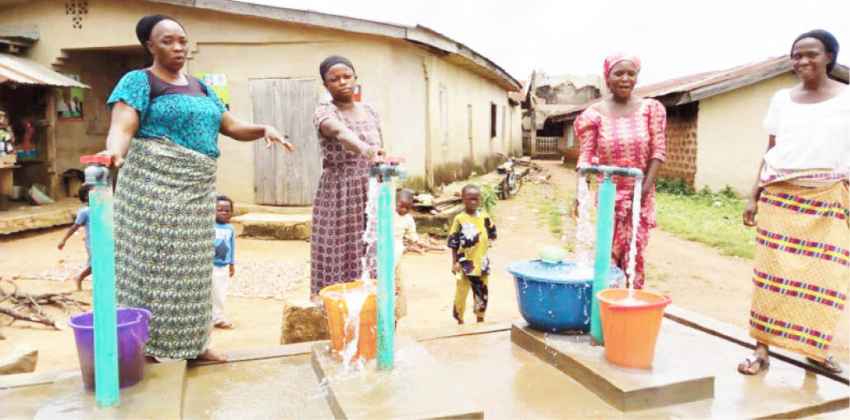The boreholes that saved Osun communities from water shortages
Away from the buzz of Osogbo, the capital city of Osun State, lies Oke-Ila, the ancient capital of the old Igbomina-Yoruba city-state. Today it lies in Ifedayo Local Government Area. But due to chronic water shortages, for the dwellers of this ancient city, it could as well have been the stone age. As in ancient […]

A few months ago, these women considered leaving their homes due to water shortage
Away from the buzz of Osogbo, the capital city of Osun State, lies Oke-Ila, the ancient capital of the old Igbomina-Yoruba city-state. Today it lies in Ifedayo Local Government Area. But due to chronic water shortages, for the dwellers of this ancient city, it could as well have been the stone age.
As in ancient times, housewives and children had to trek long distances to the stream to fetch water for domestic chores.
In Sanni-Otin community in Odo-Otin Local government area of the state, some 32 kilometres from Oke Ila, the story was no different. There, water shortages during the dry season forced some women to abandon their homes. Others had no where to go so they stayed.
The water scarcity in the state was not limited to Ifedayo and Odo-Otin local government areas creating an active emergency.
A Water, Sanitation and Hygiene (WASH) Specialist with the United Nations Children Fund (UNICEF), Mr Moustapha Niang said 57 million Nigerians do not have access to safe water supply and that more than half of these numbers live in rural areas.
He added that 15 million Nigerians still drink water from rivers, lakes, ponds, streams and irrigation canals while 45,000 children under the age of five die annually from diseases caused by poor access to water, sanitation and hygiene.
Pastor Adeosun, a retired police officer is the Vice-Chairman of Sanni-Otin Community Development Association. He lives in the community and feels the plight of his people.
“Water scarcity was making life difficult in this community. Our wives and children went through stress and wasted useful time struggling to get water. It was a very terrible situation,” he said.
Mrs Asimotu Jolayemi, a petty trader, also lives in the community. She lamented that water shortage was stunting development in the areas as countless productive hours were wasted searching for water, which in the end was not clean.
Prior to that, the state government provided water through the state water corporation. But this was not enough to go around the state.
Since July this year, the fortunes of these communities have changed.
“In the past, we had to trek a long distance to the stream to fetch water but now the story is different,” Mrs Moradeke Adeniyi, a housewife in Oke-Ila said.
The reason for her new tune was the over 400 boreholes provided by the European Union (EU), UNICEF and the state government.
The General Manager of the Osun Rural Water and Environmental Sanitation Agency (RUWESA), Mr Adiatu Olaposi said 480 hand pumps and solar boreholes have been provided in the communities in Odo-Otin, Ifedayo and Ayedaade Local Government Areas and 129 others are ongoing and that the projects would provide portable water for about 60,000 people in the state.
Olaposi said the EU/UNICEF Water Supply and Sanitation Sector Reform Programme II involves provision of Water, Sanitation and Hygiene facilities in Communities, Schools, Health Centres and Public Places. He stated that EU/UNICEF contributed 70 percent of the cost of the projects, the state government constituted 15 percent, the local government contributed 10 percent while the communities also contributed five percent of the funding.
For women like Juliana Idowu, this intervention was life-saving. Found at the foot of a borehole pumping water into her container, Mrs Idowu said she and her family had been considering leaving the community before the intervention.
“Unlike before, I’m not wasting time going to the stream to fetch water again. Water scarcity was a big problem that almost forced me to leave this community but that problem has been alleviated,” she said.
The new lease of life in the communities can be seen at St. Peters Anglican Primary School in Inisa where pupils happily troop out of their classes and dash for the borehole in the compound during break time. Amids the splash of water rings their happy laughter as they drink and wash their feet.
Master Raphel Afolabi is the President of the Health Club at St. Peter. He said they are also getting water to take care of their hygiene, particularly to clean the toilets and the environment and to wash their hands after defecation.
From a community that barely survived on water from the streams, boreholes are a huge step up and, in the future, they can dream of pipe borne water gushing into their houses. Perhaps someday soon.
